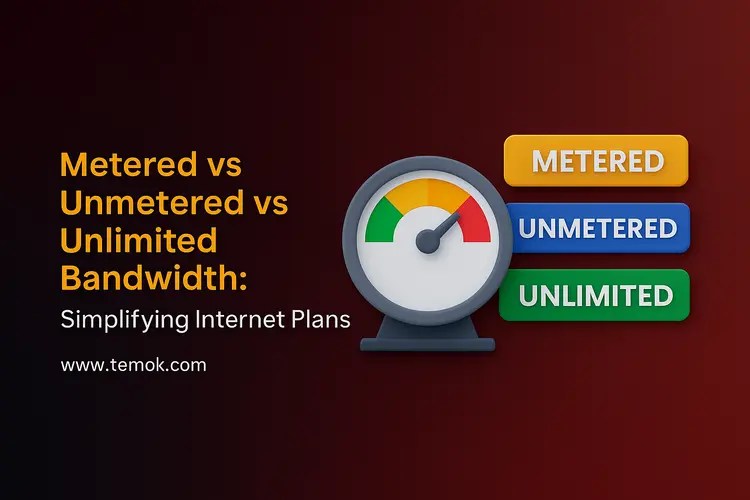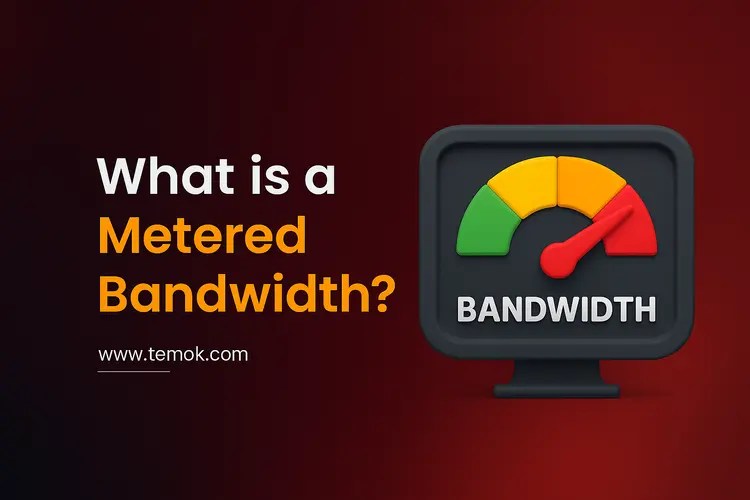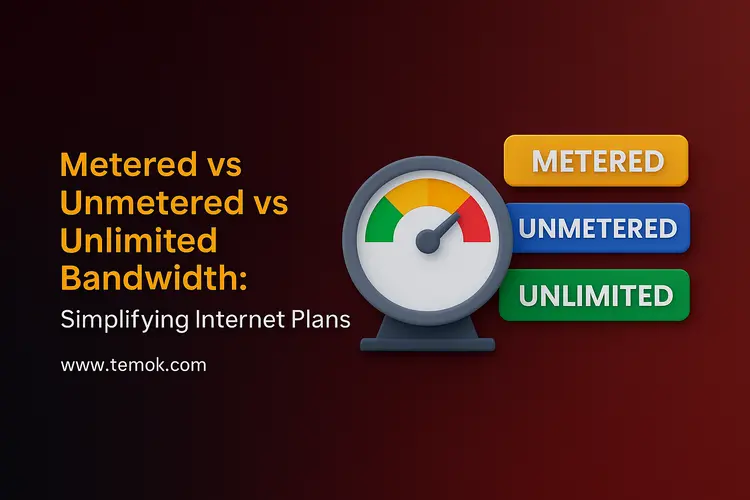Bandwidth is a key element of internet connectivity; it affects the speed at which data can travel across networks or devices. To make wise choices regarding their internet usage and service subscriptions, people and organizations must have a thorough understanding of the many types of bandwidth, including metered vs unmetered vs unlimited bandwidth.
For two devices, a suitable bandwidth typically falls between 12 and 25 megabits. Your internet bandwidth is performing better if it is within this similar range. The number of connected devices affects the bandwidth as well.
Keep reading and exploring to learn key differences between the metered bandwidth, unmetered bandwidth, and unlimited bandwidth in 2025.

Table of Contents
What is a Bandwidth?
Bandwidth is the fastest possible data transfer rate via a network or internet connection. It establishes the maximum speed at which it sends data between different locations. The following units bandwidth measurements: gigabits per second (Gbps), megabits per second (Mbps), kilobits per second (kbps), and bits per second (bps). Moreover, bandwidth is the ability of a network connection to send data. It sometimes has a link to a pipe’s breadth, where a larger pipe allows for the simultaneous passage of more data.
One of the most common misconceptions regarding a bandwidth plan is that it is the same as speed. Technically speaking, speed is the rate at which data is transmitted. Bandwidth, on the other hand, is the capacity to use that rate. This is a subtle distinction. Speed is the rate at which information may be sent.
Gigabytes typically measure and sell bandwidth. Overall data flows are also tracked in web hosting. Concepts like “metered,” “unmetered connection,” and “unlimited” bandwidth come into play here. Let’s now discuss the main metered vs unmetered vs unlimited bandwidth concepts for your better understanding in 2025.
Metered vs Unmetered vs Unlimited Bandwidth: Understanding the Internet Plans
Before we get into the main difference, let’s discuss each bandwidth one by one for your better understanding:
What is a Metered Bandwidth?

Your overall bandwidth usage has tracking and billing appropriately when you have a metered bandwidth plan. Assume that the data transmission capacity of your plan is 100 GB. Your bandwidth is 50 Mbps.
You use 50MB of your 100GB plan for every second of data transfer. Although there is room for improvement, the comparison between a metered connection and a home internet service might be a helpful place to start. The speed is 50 Mbps, and the total data cap is 100 GB. The more you use the Internet, the less storage space you have accessible overall.
Metered connections are no different. The only distinction in this case is that your server has proper tracking. Like when you use the Internet, you will need more data if your server sends pictures or movies.
Overuse of data may result in service termination or bill increases. It depends on the web host that is selected.
Also Read: What is Internet Latency: How To Reduce It Effectively
What is an Unmetered Bandwidth?
The term “unlimited bandwidth” is a more accurate version of unmetered bandwidth than truly unmetered bandwidth. You may use as much data as you like with unmetered bandwidth hosting since there are no restrictions. Moreover, there is no tracking of the data transfer rate.
This also means that you can have assurance that you won’t be charged unexpectedly if you go over the limit, or that your hosting plan won’t be secretly changed to a more expensive one. Therefore, it won’t become a problem if you operate a website that has an expanding volume of data transportation around it. It is the main metered vs unmetered vs unlimited bandwidth difference if you compare it with others.
One benefit of using unmetered bandwidth hosting is that there is a one-time and final cost for the speed, eliminating the need to worry about surprise price increases. Your speed will have a limit of 50Mbps if you select a hosting package that supports that amount, and that’s it. Additionally, you won’t ever have to worry about data fatigue again.
The foundation of unmetered connection bandwidth hosting has a fixed cost for a predetermined speed. You don’t care how much data your server sends or receives.
What is an Unlimited Bandwidth?
First of all, realize that unlimited bandwidth does not equate to unlimited capacity. If your company needs to transfer a lot of data and you are unsure of how much bandwidth this will demand, an unlimited bandwidth package can be the best option for you. For example, your website receives thousands of visits every day, and you expect your web hosting plan to require a significant amount of bandwidth. Selecting an unlimited bandwidth package and using as much data transmission as necessary would become advantageous in this situation.
The word “unlimited” may be misleading in some contexts. The plans and packages that hosting businesses offer usually include bandwidth limitations. But most websites never use that much bandwidth since the limitations are so high, so it’s “unlimited.”
Since limitless basically means offering a quantity that a tiny website can’t use, this could be the case for smaller sites that choose shared hosting. Because of this, they never get to the limit, giving the impression that it is infinite.
Metered vs Unmetered vs Unlimited Bandwidth: Key Differences

Let’s now discuss the main metered vs unmetered vs unlimited bandwidth comparison:
Predictability of Cost and Billing
Metered Plans may first seem less expensive since you only pay for a specific limit, but if your traffic increases, you may be surprised by the additional expenses. Your data pool may have a rapid depletion due to a startling spike in visitors, requiring you to increase your plan or incur overage costs.
Unmetered Plans make budgeting simpler because you often pay a set sum for a specific connection speed. Since you are not billed by the gigabyte, your bill remains the same even if the traffic to your website doubles.
Unlimited Plans are promoted as “set it and forget it” choices. No matter how much bandwidth you use, you pay one charge. The caution is that, to cover the web hosting provider risks, these plans are frequently more expensive than metered or unmetered packages.
Performance And Unspoken Costs
High speeds are possible with metered, but excessive use is penalized with additional fees.
Unmetered provides speed dependability, but if you’re sending large volumes of data, it could feel “slower.”
Unlimited may seem like the best option, but many providers covertly impose “fair usage” policies, which means they may reduce speeds if your behavior puts a load on their network.
Also Read: Best Web Hosting For Small Business: The Right Web Hosting Choice
Monitoring Bandwidth

When it comes to metered bandwidth, the business keeps an eye on the total amount of bandwidth used. The amount of bandwidth consumed determines the user’s bill. In this instance of capped bandwidth, bandwidth tracking is a crucial step.
Here, unmetered bandwidth is advantageous. A basic bandwidth speed has a charge to the customer. Here, the total amount of data transfer has no tracking. The only thing that will be tracked is speed. It is the main difference if you compare metered vs unmetered vs unlimited bandwidth.
This is where the GB consumption has proper monitoring. It is not completely infinite, despite the firms’ claims to the contrary. The server stops and either updates the limit or pays if you go over the allotted bandwidth.
Suitability For Different Users
Small blogs, personal websites, or companies with steady and modest visitor counts are the ideal candidates for metered bandwidth. A metered plan keeps expenses under control if you are sure that your consumption won’t fluctuate much.
However, unmetered bandwidth is ideal for developing companies, media-heavy websites, and expanding corporations. For instance, a gaming community or a photographic portfolio may appreciate steady performance even when they are unsure of the amount of data that will be used.
Last but not least, larger businesses, ecommerce business websites, or streaming platforms that cannot afford disruptions tend to select plans with unlimited bandwidth. Despite pushing heavy traffic and erratic surges, these users gain peace of mind.
Conclusion
We frequently inquire as to what options and bandwidth packages they ought to purchase if you compare Metered vs Unmetered vs Unlimited Bandwidth. The solution is straightforward. You must consider what best suits your needs. Metered bandwidth is an option if you desire bandwidth for home usage, at a novice level, and for one or a few modest websites. It would be more cost-effective and valuable to you.
Don’t sign up for anything before reading the fine print, since the phrase “unlimited bandwidth” itself is deceptive. It’s similar to hosting with metered bandwidth, but it’s more complicated.
FAQs (Frequently Asked Questions)
What Is The Difference Between Unmetered And Unlimited Bandwidth?
The main distinction is that unmetered bandwidth means your data consumption is not tracked and you do not pay for overages, but the speed is constrained by the network’s physical capacity. In contrast, unlimited bandwidth has no limit on the quantity of data you may transport.
What Is Better, Metered Or Unmetered?
Users may move massive volumes of data without worrying about going over limitations or paying extra fees thanks to unmetered bandwidth, which allows for unlimited data consumption.
Which Is Better, Metered Or Unmetered Wi-Fi?
Since unmetered Wi-Fi provides unlimited bandwidth at a set price, it is preferable for high-usage activities like streaming and gaming. For those who need to keep expenditures under control or have restricted data plans, meter Wi-Fi is preferable.
Does Unlimited Data Mean Unlimited Bandwidth?
You won’t have unlimited speed, but you will have unlimited access. After you use a specific amount of data, throttling is still a common feature of unlimited plans. Your Internet speed may drop from 100 Mbps to 5 Mbps or even 1 Mbps due to this throttling, making video calls and streaming all but impossible.
